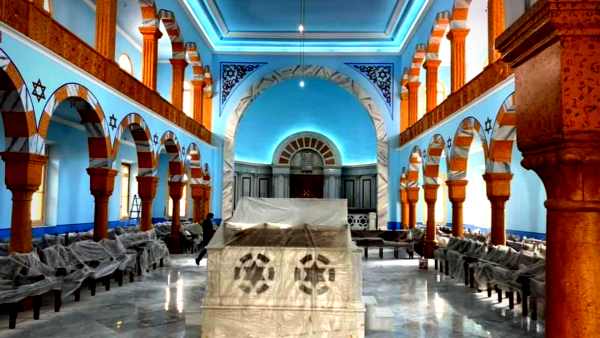More than three months after the huge blast that hit the Lebanese capital resulting in the destruction of entire neighborhoods, social media users shared news and photos of the "reopening" of Beirut's largest and most famous synagogue that is located in a part of the city formerly known as the Jewish quarter, which is part of the area impacted by the blast.
كنيس يهودي في بيروت افتتح أمس بصمت بعد ترميمه بأموال لبنانية!
— Rαɱα? (@Ram7Leb) November 20, 2020
إعادة افتتاح كنيس ماغين أبراهام وهو الوحيد في حي اليهود القديم بوادي أبو جميل ببيروت
ويعتقد أرازي من أهم الأسباب التي دفعت إلى المشاركة في تجديد الكنيس الحنين للبنان القديم وشركة سوليدير ساهمت بتبرع قدره 150ألف دولار pic.twitter.com/kPjrU7nBWu
Translation: "Quietly, a Jewish synagogue has been reopened in Beirut yesterday after a Lebanese-financed renovation. The Maghen Abraham Synagogue is the only synagogue at the Wadi Abu Jamil district, the old Jewish quarter. Arazi thinks that one of the main reasons for the renovation has been the nostalgia for the old Lebanon, in addition to a $150k donation from the Solidere company."
At the heart of the Wadi Abu Jamil district, the Maghen Abraham Synagogue has been renovated this month, sparking questions over the timing of its opening, and the source of the money used in the renovation process.
Despite several news outlets reporting the reopening of the synagogue, Al Araby has reported statements by Bassem Al-Hout, the lawyer who represents the interests of about 200 Lebanese Jews, explaining that "the building is not yet open to the public."
Meanwhile, questions have been raised over possible political connotations of the move, especially as the Lebanese government which has allowed the renovation, continues to have a strong anti-Israel stance. The announcement has also highlighted the history of Lebanon's Jewish population over the years.
The 1929 synagogue was built by a number of notable Lebanese Jewish figures, including members of the well-known Lebanese-Iraqi Jewish family of Sassoon.
Maghen Abraham #Jewish #Synagogue in downtown #Beirut refurbished.
— Joe Issa-El-Khoury (@JoeIssaElKhoury) November 19, 2020
The day all Jewish Lebanese are back home will be a sign that #Lebanon is in peace with itself ?? pic.twitter.com/P8VRgHasAf
#دلالات
— Dalal Abou Haydar (@DalalAbouHaydar) November 20, 2020
من "جميل المصادفات" أو غريبها في #لبنان افتتاح كنيس #الطائفة_اليهودية في وادي أبو جميل (الذي انتهى ترميمه منذ سنوات) بالتزامن مع مفاوضات #ترسيم_الحدود وموجة #التطبيع #والعقوبات و #الادارة_الاميركية_الجديدة ...و #الله_أعلم#نيرونيون #عا_جهنم #كلن_يعني_كلن #الفساد #السلاح pic.twitter.com/mGtpP497Xn
Translation: "It's a weird, yet "nice coincidence" to have Lebanon's Jewish synagogue reopen after having been renovated many years ago, at the same time Lebanon and Israel discuss borders, amid a normalization wave, US sanctions, and the new US administration."
According to a report by the New York Times, about 100 Lebanese Jewish families were residing in the Wadi Abu Jamil district up until the 1982 Israeli invasion of Lebanon. During the Israeli invasion, the Maghen Abraham Synagogue was heavily hit by Israeli strikes, which forced dozens of Jewish families to flee for their lives. The report notes that by the end of the Israeli military offensive, only seven Jewish families had remained in the neighborhood.
In 2009, many Lebanese officials, including those of Hezbollah, had expressed their support to renovate the country's largest synagogue, so the country's Jewish population (estimated by about 100 people according to Atlantic) can practice their faith, largely financed by the Lebanese Jewish ex-pat community residing all across the world.
ביירות : בית הכנסת מגן אברהם אחרי הפיצוץ.
— ינון עידאן (@yinon_idan) August 19, 2020
שופץ לפני כ10 שנים על ידי הממשלה והנשיא. pic.twitter.com/iJgtGzQKQA
Translation: "Beirut: The Magen Avraham Synagogue after the explosion. Renovated about 10 years ago by the government and the president."
However, the huge blast that hit the Beirut port last August, destroying several neighborhoods, including the Wadi Abu Jamil district, had impacted the synagogue again, which resulted in the most recent renovation.
News of the renovation that occurred at the same time Lebanese and Israeli officials have agreed to sit together for the first time to discuss borders between the two countries, ignited many questions over the possibility of political talks with other purposes, such as a possible normalization between the two countries.
*هل بدأت مقدمات التطبيع في لبنان ?*
— Haitham Srour (@HaithamSrour4) November 21, 2020
*?بعد عشر سنوات: اعادة افتتاح الكنيس اليهودي في وادي ابو جميل.*
كنيس ماغين أبراهام (بالعبرية: בית הכנסת מגן אברהם - "بيت ه-كِنِسِّت مَغِن ابرهم") هو الكنيس اليهودي الأقدم والوحيد في بيروت. ولا زال الكنيس قائما في شارع وادي أبو جميل pic.twitter.com/ahemUdkTLg
Translation: "Is this the beginning of normalization between Lebanon and Israel? 10 years after its renovation, the Maghen Abraham Synagogue has been reopened in Wadi Abu Jamil. It's the oldest and only synagogue in Beirut."
Such speculations have been especially supported by a number of surprising agreements of normalized relations between Israel and the UAE, Bahrain, and Sudan.
These comments have also cited the US tightened sanctions on Lebanese officials who are allied with Hezbollah, which strongly opposes any talks with Israel.







